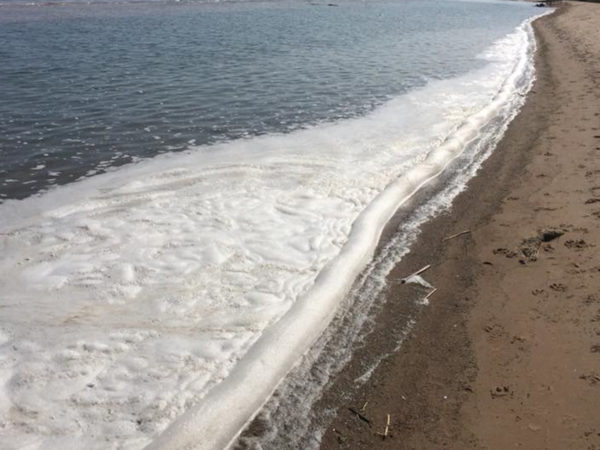
PFAS, short for per- and polyfluoroalkyl substances, are a group of widespread man-made chemicals that don’t break down in the environment or the human body and have been flagged as a major contaminant in sources of water across the country.
Keep up with PFAS-related developments in the Great Lakes area.
Click on the headline to read the full story:
Michigan
- Nessel files suit against paper company for PFAS contamination in St. Clair County — Michigan Advance
Attorney General Dana Nessel announced a lawsuit addressing the release of PFAS by a Port Huron, Michigan paper company. The lawsuit alleges Domtar falsely declared its waste as non-hazardous in the 90s, before transporting it to a Port Huron landfill for over 20 years.
Ohio
- Revealed: Nearly 100 potential PFAS-polluted sites in Pennsylvania, Ohio and West Virginia from fracking waste — The Daily Climate
A new map reveals waste from fracking wells that used PFAS has been dumped at dozens of sites in Ohio, Pennsylvania and West Virginia and could potentially contaminate soil and groundwater.
Wisconsin
3M Co. made the historic announcement that it is leaving the business of manufacturing “forever chemicals” — a multibillion dollar industry the company helped found nearly six decades ago. The conglomerate behind Post-It notes and Scotch tape, will stop making controversial PFAS substances by the end of 2025.
- Why 3M Can’t Escape PFAS Liability by Ending Production: Charts — Bloomberg Law
3M is named as a defendant in more than 3,500 PFAS-related lawsuits. It will cease production of all PFAS by the end of 2025 due to a confluence of reasons that includes shifting industry desires and accelerating regulatory trends. But the company is facing a deluge of litigation that won’t end when production does.
- As 3M says it’ll stop making PFAS, huge unsolved problems with “forever chemicals” linger — The Maine Monitor
Billions in eventual legal settlements with 3M could cover PFAS forever chemicals testing, cleanup and health costs.
Wisconsin and all other states have seen the effects of PFAS. Those pushing for their removal say 3M’s announcement to phase them out is another step in the right direction.
The company said last week it would no longer make the chemicals, which don’t break down in the environment and linger in bodies. But researchers and advocates said the contamination will persist.
National
Researchers claim to have found a method to break up PFAS, into smaller and less harmful compounds in drinking water. The technique could be added to the water purification process to prevent the concerning build-up of these chemicals.
- Congress lines up PFAS help for farmers — E&E News
House and Senate appropriators agreed to devote $5 million to help farms test for PFAS which is present in many products and has found a way onto farms through the sludge some producers spread as fertilizer.
- Is It Officially Time to Ditch PFAS? — Architectural Digest
But like most things, if it seems too good to be true, it probably is. And according to a multitude of sustainable design experts, there is cause for concern over PFAS. California is eliminating PFAS in textiles by 2025. Is it time designers everywhere followed suit?
Catch more news at Great Lakes Now:
PFAS News Roundup: New regulations approved, new solutions explored
PFAS News Roundup: “Forever chemicals” may pose bigger risk to health than scientists thought
1 Comment
-
If and when 3M stops making PFAs isn’t the question anymore. They and other PFAs manufacturers have already ruined the water quality for residents for decades to come. This is our source of clean potable water, fish to eat, recreation. It’s on them to find and resolve what they’ve damaged. Nothing is more vital and important. They should be held responsible.




